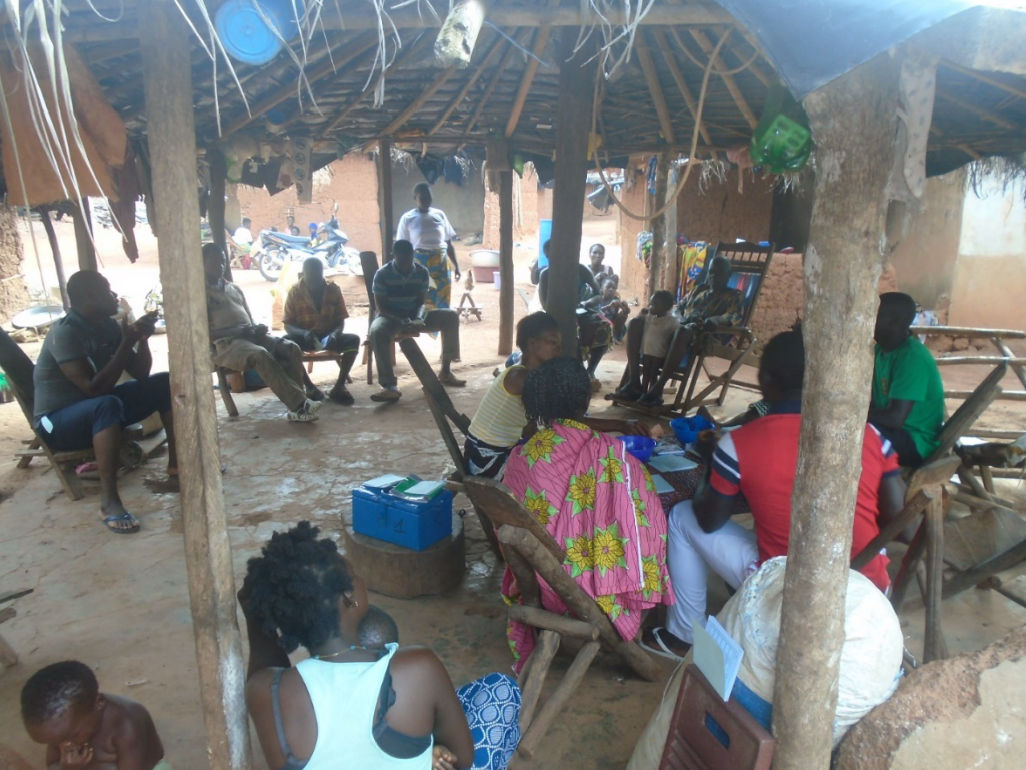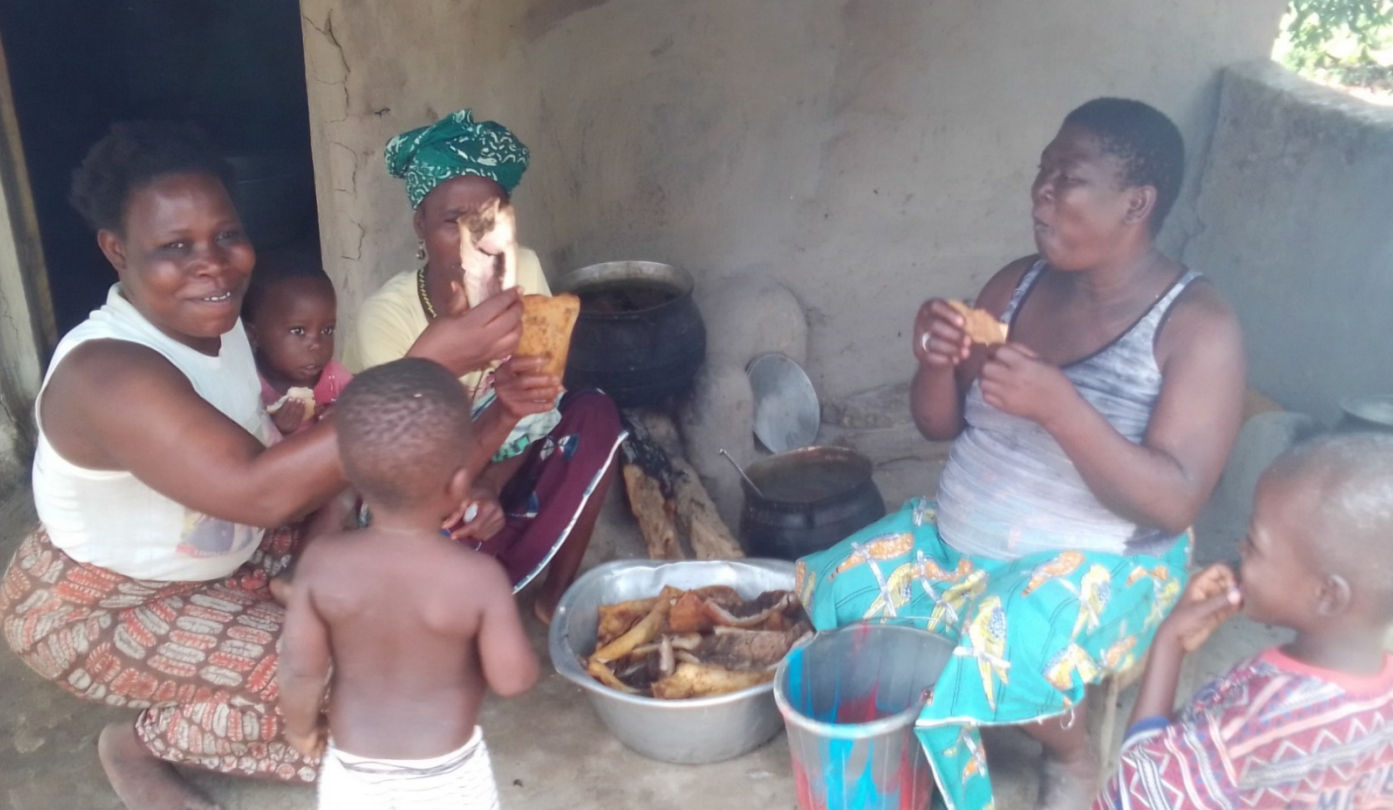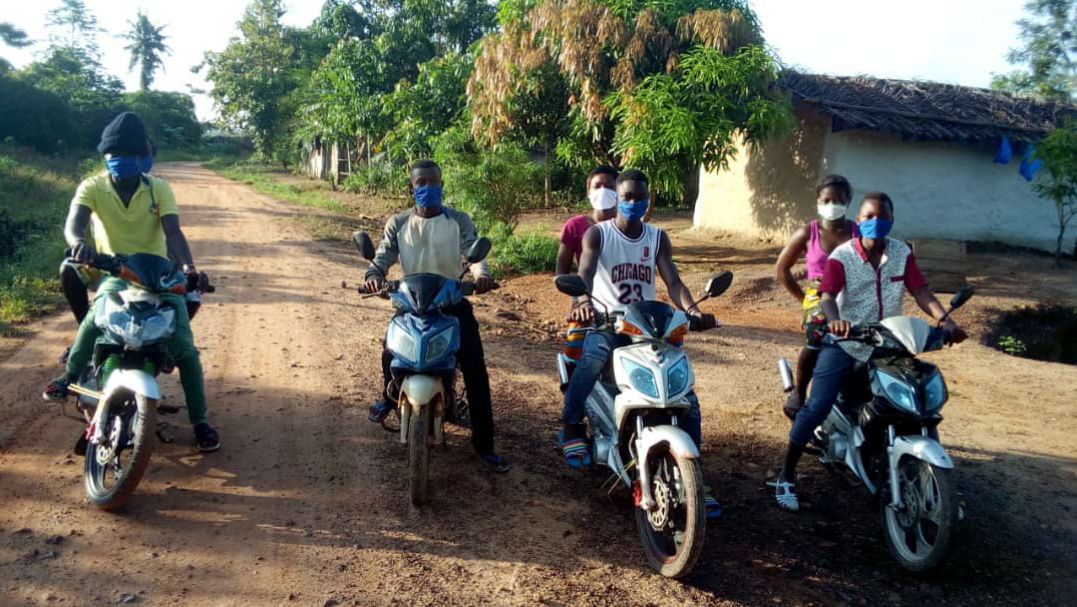Our projects
Focus areas
- Income diversification for young people
- Health
- Drinking water
- Schools
- Women’s empowerment
Our approach
Before starting projects in a village, our project managers and the villagers identify the main needs and, if necessary, set up local organisational structures to ensure the long-term effectiveness of the projects. We involve local businesses and use local materials wherever feasible.
To make our projects as effective and sustainable as possible, we cultivate good relationships with the local authorities and village communities and promote ‘local ownership’. For example, local committees are responsible for maintaining the drinking water installations we have sponsored.
Our projects are funded through donations from private individuals, foundations, companies and public institutions.
Income diversification for young people
Problem:
Opportunities for young people in the cocoa villages are limited and education levels typically low. Those who can, leave to find work in towns and cities. Those who remain tend to work on their parents’ cocoa farms or in the cocoa sector.
CABOZ Action’s approach:
We help young people in the cocoa villages where we work improve their economic situation and become more resilient through a Youth Farmer Field School Project (YFFS), together with a Village Savings and Loan Associations (VSLA) scheme and Gender Sensibilisation. We are grateful to the Jacobs Foundation and the company CABOZ for funding this project as part of the TRECC programme.
The holistic approach used has three main components: 1. improving cocoa crop yields through good agricultural practices; 2. generating funds through regular saving and budgeting household expenditure; and 3. diversifying participants’ incomes using the saved funds to set up Income Generating Activities (IGAs).
CABOZ Action began developing the YFFS project in January 2020, after the pilot project came to an end in 2019. It is now also being implemented in the Duekoué region. Lydie, our project manager there, is responsible for four groups, while Fulbert, the project manager in the Soubré region, is in charge of six groups. Each group has about 25 to 30 members aged between 15 and 35 years. The proportion of women is around 43%. Under the guidance of Lydie and Fulbert, each group is closely coached by a ‘facilitator’, who earns a little extra money to pass on the training they receive in business and agricultural skills to the other group members.

The groups usually meet once a week. Whenever they have a meeting, each member puts a small amount of money in the common savings “pot”, and by the end of 2020 they will have raised over CHF 1000 per group. The members are enthusiastic and motivated to increase their weekly contributions to the savings scheme since the more they have in the pot, the more they will be able to finance new activities. The CABOZ Action staff carry out regular audits to check that the savings and loans are accurately documented and the correct amount of money is in the pot. They also help handle any problems as they arise.
Initially, many were reluctant to borrow from the pot, as indebtedness is culturally viewed unfavourably. In the meantime, however, the 10 groups have selected about 40 Income Generating Activities (IGAs) that they would like to implement individually or collectively with the savings. These IGAs range from selling eggs, cloths, fuel and hygiene products to growing corn or beans, raising pigs, selling food (see photo below) and processing manioc.

From the very beginning, care was taken to include women in the groups, and some of the group activities include raising awareness of gender issues. Selected group members are coached as so-called “change-makers” and serve as role models in their local communities promoting more cooperation between women and men in family decision-making, budgeting and household tasks.
Lydie reports that participation in the training courses has been high and that they have been very well received. Typical comments (glossed) from participants were: “Without these courses there would be no peace and quiet at home” and: “Without these training courses it would be like two blind people leading each other”. Another participant says that he previously considered the daily task of sweeping the yard to be exclusively women’s work, and that he now sometimes sweeps his wife’s yard just to please her. This may make us smile, but considering how traditionally work in these village societies is strictly divided along gender lines, such gestures mean a great deal.Another change-maker reports that he advised his neighbours on how to make ends meet by budgeting and planning their work better.
Health
Problems:
- “The high numbers of maternal and child deaths constitute a major problem…, and gaps remain … in basic healthcare.” (European Commission, January 2016).
- Covid 19
CABOZ Action’s approach:
- Provide courses for women in the cocoa villages on health, contraception, hygiene and nutrition.
- Covid 19 prevention campaign: fortunately, the corona virus pandemic has so far had a less devastating impact in Africa than initially feared. But prevention measures are particularly important in countries with few beds in intensive care. For this reason, CABOZ Action, with the support of the Jacobs Foundation, is conducting awareness campaigns in 44 cocoa villages in the partner regions. At the meetings of the 10 YFFS youth groups, participants have been regularly reminded about the prevention measures since the beginning of the pandemic. Now 34 more villages are benefiting from the information and material, such as soap and patterns for masks, we provide. The campaign follows national guidelines and passes on tips compatible with local village customs in our partner regions. These include hygiene rules for washing hands, as well as the correct use of reusable fabric masks, which we help villagers produce locally.

Drinking water
Problem:
Only 65% of the rural population in Côte d’Ivoire has access to good drinking water according to the Ivorian National Office for Drinking Water.
CABOZ Action’s approach:
- Construct new wells and latrines, and renovate old wells – see Annual Reports for 2013 and 2014.
- Install rainwater tanks at schools with pumps, micro-filters and UV lamps supplied by Aqua Pura, who have also financed the solar panels and batteries to run the system at three schools. Around 600 school pupils and 18 teachers now have access to clean drinking water.
- Install a pump for drinking water in a village in the Duékoué region and set up and support a village water management committee – completion planned in early 2021.
Schools
Problem:
Most villages lack well-equipped classrooms, kindergartens and school canteens. As parents are often out working in the fields, some families may not have lunch. Sometimes they have to help their parents on the farms.
CABOZ Action’s approach:
Provide school material (crayons, books and blackboards), as well as locally made school desks. Construct school canteens to feed around 600 pupils and classrooms.
Women's empowerment
Problem:
Many women have had little schooling. They tend to have children when they are rather young and have no independent source of income. Traditionally have little authority even within the family, despite doing much of the work.
CABOZ Action’s approach:
- Help to start women’s committees in the villages and support their projects.
- Involve young women in the YFFS project and its income-generating activities.
- Encourage both men and women to participate in the gender sensitisation part of the YFFS project – see Income Diversification above.
Make a donation
CABOZ Action
IBAN: CH96 0839 0031 7536 1000 0
BIC (SWIFT-Code): ABSOCH22
Hermetschloostrasse 70, 8048 Zürich
Please note donations to CABOZ Action are tax-deductible in most Swiss cantons.
Contact
Silvia Dingwall
President CABOZ Action
Sternenstrasse 7, 5415 Nussbaumen
Tel: +41 79 564 56 37
E-Mail: silvia.dingwall@cabozaction.org
We thank our long-term partners: 